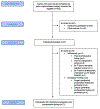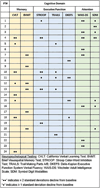Incidence of postoperative cognitive dysfunction in older women undergoing pelvic organ prolapse surgery
- PMID: 32827107
- PMCID: PMC8721672
- DOI: 10.1007/s00192-020-04495-y
Incidence of postoperative cognitive dysfunction in older women undergoing pelvic organ prolapse surgery
Abstract
Introduction and hypothesis: Postoperative cognitive dysfunction (POCD), a transient impairment of memory, concentration, and information processing, has been reported after 7-26% of non-cardiac surgeries with associated increase in morbidity and death. Our primary aim was to determine the incidence of POCD 2 weeks after prolapse surgery in women ≥ 60 years old. Our secondary aim was to identify risk factors for POCD.
Methods: Prospective cohort study of women ≥ 60 years old scheduled for pelvic organ prolapse surgery. Exclusion criteria included cognitive impairment history, major neurologic disorder, and abnormal cognition screen. A comprehensive neuropsychologic (NP) battery (eight tests), administered 2 weeks pre- and post-surgery, assessed premorbid IQ and domains of attention, memory, and executive function. The primary outcome was defined as decline of ≥ 1 SD on ≥ 2 NP tests or decline of ≥ 2 SD on ≥ 1 test. Raw scores were transformed to Z-scores.
Results: NP testing was completed by 72 women, median age 72 (IQR 69-77) years. Procedures included 16 (22.9%) laparoscopic sacrocolpopexies, 23 (32.9%) transvaginal reconstructions, and 29 (41.4%) obliterative surgeries, performed under general (63, 90%), regional (5, 7.1%), or sedation (2, 2.9%) anesthesia with a median hospital stay of 0.6 (IQR 0.6-0.75) days. POCD incidence was 33.3% (n = 24). POCD was associated with greater frailty (p = 0.006) and higher baseline depression (p = 0.05) but not with older age (p = 0.77) or inhalational gas use (p = 1.0).
Conclusion: In this cohort, one in three women manifested POCD 2 weeks after prolapse surgery. Preoperative counseling should include discussions on POCD given its detrimental impact on postoperative recovery and independence.
Keywords: Cognitive decline; Older women; Pelvic organ prolapse surgery; Perioperative neurocognitive disorders; Postoperative cognitive dysfunction; Urogynecologic surgery.
Figures
References
-
- Monk TG, Weldon BC, Garvan CW, et al. Predictors of cognitive dysfunction after major noncardiac surgery. Anesthesiology 2008;108:18–30. - PubMed
-
- Newman S, Stygall J, Hirani S, et al. Postoperative Cognitive Dysfunction after Noncardiac Surgery. Anesthesiology 2007; 106:572–90. - PubMed
-
- Moller JT, Cluitmans P, Rasmussen LS, et al. Long-term postoperative cognitive dysfunction in the elderly ISPOCD1 study. ISPOCD investigators. International Study of Post-Operative Cognitive Dysfunction. Lancet 1998;351:857–61. - PubMed
-
- Kirby AC, Luber KM, Menefee SA. An update on the current and future demand for care of pelvic floor disorders in the United States. Am J Obstet Gynecol 2013;209:584.e1–5. - PubMed
MeSH terms
Grants and funding
LinkOut - more resources
Full Text Sources
Medical
Miscellaneous



